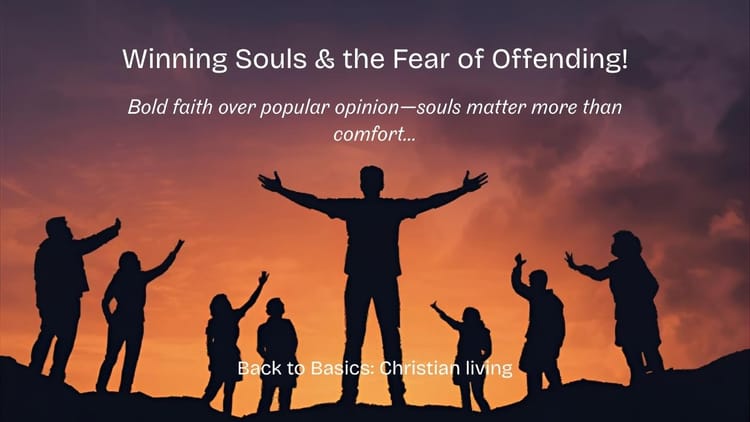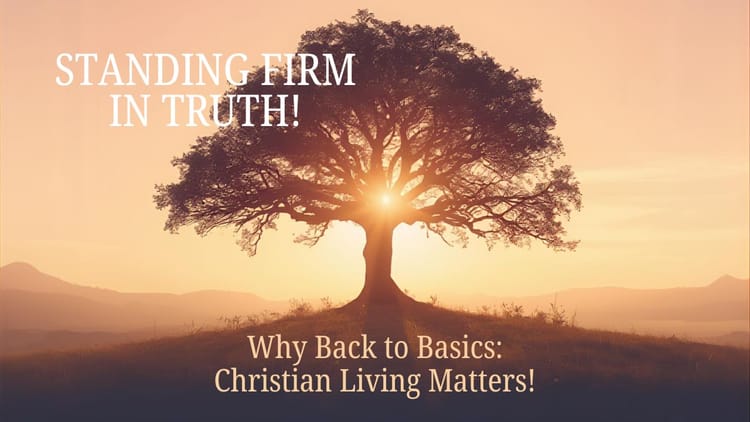Who Do You Want To Be?

The Question That Shapes Our Identity
As Christians, we often talk about our journey of faith, our spiritual growth, and our walk with the Lord. But have we ever paused to consider a seemingly simple yet profoundly important question: Who do we want to be?
In a world filled with countless role models, influencers, and examples vying for our attention and imitation, we must be intentional about whom we choose to become. Our standard, as followers of Christ, should be nothing less than Christ Himself.
The Call to Christlikeness
Scripture is abundantly clear that our ultimate goal as believers is to become like Christ. The Apostle Paul understood this well when he wrote to the Corinthians: "Be ye followers of me, even as I also am of Christ" (1 Corinthians 11:1 KJV). His encouragement wasn't to follow him as an end in itself, but only insofar as he followed Christ.
Similarly, to the Ephesians, he wrote about growing "unto the measure of the stature of the fulness of Christ" (Ephesians 4:13 KJV). This is our divine calling—to be transformed into the image of the Son.
But what does this look like practically? How do we become like Christ in our daily lives?
Character Over Reputation
In our social media-saturated age, it's easy to become obsessed with our public image—how others perceive us, the number of followers we have, the likes on our posts. But Christ calls us to focus on character, not reputation.
King Solomon, in his wisdom, understood this when he wrote, "A good name is rather to be chosen than great riches, and loving favour rather than silver and gold" (Proverbs 22:1 KJV). A good name doesn't come from carefully crafted online personas but from a life of integrity, honesty, and genuine love for others.
Jesus Himself warned against the hypocrisy of the Pharisees who were more concerned with external appearances than internal reality: "Woe unto you, scribes and Pharisees, hypocrites! for ye are like unto whited sepulchres, which indeed appear beautiful outward, but are within full of dead men's bones, and of all uncleanness" (Matthew 23:27 KJV).
The question, then, is not "How do I want others to see me?" but "Who am I when no one is watching?"
Transformed by the Word
Our transformation into the likeness of Christ doesn't happen overnight. It's a process, a journey of daily surrender and renewal. Paul describes it this way: "And be not conformed to this world: but be ye transformed by the renewing of your mind, that ye may prove what is that good, and acceptable, and perfect, will of God" (Romans 12:2 KJV).
This transformation begins in the mind, which is why immersing ourselves in God's Word is so crucial. Through Scripture, we encounter Christ, learn His ways, and are challenged to align our lives with His truths.
The Psalmist understood the power of God's Word in shaping character: "Thy word have I hid in mine heart, that I might not sin against thee" (Psalm 119:11 KJV). The more we internalise Scripture, the more it shapes our desires, choices, and actions.
The Fruit of the Spirit
As we grow in Christ, certain qualities begin to manifest in our lives—what Paul calls the "fruit of the Spirit." He lists them in Galatians: "But the fruit of the Spirit is love, joy, peace, longsuffering, gentleness, goodness, faith, Meekness, temperance: against such there is no law" (Galatians 5:22-23 KJV).
These qualities aren't mere behavioural modifications or self-improvement strategies. They're the natural outflow of a life yielded to the Holy Spirit. As we abide in Christ, just as a branch abides in a vine (John 15:5 KJV), we naturally bear fruit that resembles Him.
The Challenge of Culture
Today's culture presents a myriad of models for who we "should" be—successful, wealthy, influential, attractive, and the list goes on. These models often conflict with the Christ-centered identity to which we're called.
James offers a stark reminder: "Ye adulterers and adulteresses, know ye not that the friendship of the world is enmity with God? whosoever therefore will be a friend of the world is the enemy of God" (James 4:4 KJV).
This doesn't mean we isolate ourselves from the world, but it does mean we're careful about the values, priorities, and examples we adopt. Our primary allegiance is to Christ, not culture.
Living with Eternity in Mind
The choices we make today have eternal implications. As we consider who we want to be, we must think beyond the temporary accolades, comforts, or conveniences of this life.
Jesus posed a penetrating question: "For what shall it profit a man, if he shall gain the whole world, and lose his own soul?" (Mark 8:36 KJV). Our identity in Christ isn't just about the here and now; it's about who we'll be for eternity.
Paul lived with this eternal perspective: "I press toward the mark for the prize of the high calling of God in Christ Jesus" (Philippians 3:14 KJV). His eyes were fixed on the finish line, not the temporary distractions along the way.
A Daily Decision
Becoming like Christ isn't a one-time decision; it's a daily choice to take up our cross and follow Him (Luke 9:23 KJV). It's choosing to walk in love when it's easier to hold a grudge. It's opting for humility when pride beckons. It's pursuing purity in a culture that celebrates indulgence.
Peter reminds us that these choices are part of our calling: "For even hereunto were ye called: because Christ also suffered for us, leaving us an example, that ye should follow his steps" (1 Peter 2:21 KJV).
Christ Alone
So, who do you want to be? If your standard is Christ alone, you're setting yourself on a path of transformation, growth, and purpose. It won't always be easy, but it will always be worthwhile.
In a world of shifting standards and fleeting fame, let's anchor our identity in the unchanging Christ. As we do, we'll find that becoming like Him is not just a lofty goal—it's the very reason we were created.
"For whom he did foreknow, he also did predestinate to be conformed to the image of his Son, that he might be the firstborn among many brethren" (Romans 8:29 KJV).
Who do you want to be? Christ-like. Nothing more, nothing less…
Key Takeaways:
- Our Christian identity is shaped by our desire to be like Christ: Our standard should be Christ alone, not worldly role models or influencers.
- Character matters more than reputation: Focus on who you are when no one is watching rather than crafting a perfect public image.
- Transformation happens through God's Word: Scripture renews our minds and shapes our character as we internalise it.
- The fruit of the Spirit reflects our growth: Love, joy, peace and other spiritual qualities naturally flow from a life yielded to Christ.
- Cultural pressures challenge our Christ-centred identity: We must be careful about which values and priorities we adopt.
- Live with eternity in mind: Our identity in Christ has implications beyond this temporary life.
- Becoming like Christ requires daily choices: Christlikeness isn't achieved through a one-time decision but through consistent, intentional living.





